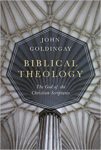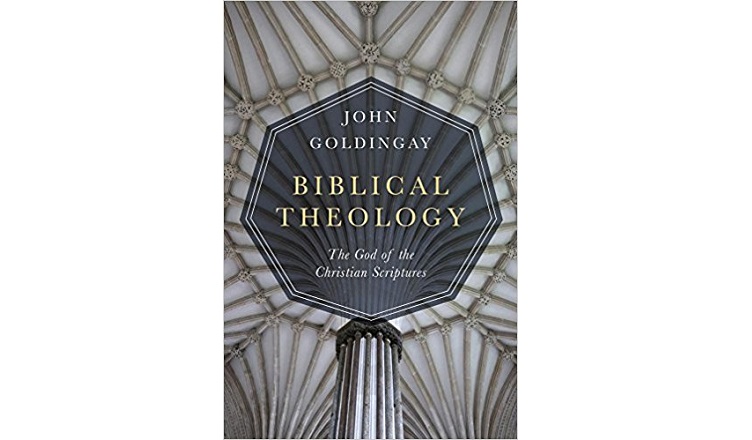 John Goldingay is a well known and respected Old Testament scholar. This book titled ‘Biblical Theology, The God of the Christian Scriptures’ is a distillation of many years of accumulated knowledge and teaching. The sheer number of works referenced is testament to the depth of his reading. While biblical theology in my opinion is quite important for interpreting scripture properly, in my experience books of this size on Biblical Theology are uncommon and thus I recommend this book for reading.
John Goldingay is a well known and respected Old Testament scholar. This book titled ‘Biblical Theology, The God of the Christian Scriptures’ is a distillation of many years of accumulated knowledge and teaching. The sheer number of works referenced is testament to the depth of his reading. While biblical theology in my opinion is quite important for interpreting scripture properly, in my experience books of this size on Biblical Theology are uncommon and thus I recommend this book for reading.
- Link: Amazon
- Length: 608
- Difficulty: Medium-Academic
- Topic: Biblical, Theology
- Audience: Educated Christians, Mainstream Christians
- Published: 2016
Biblical theology, as I understand it, follows the movement and process of the biblical narrative. It concerns salvation history. That is, it seeks to understand the relationships between the various eras in God’s activity recorded in the Bible. It tends to draw out themes and concepts that likewise are developed over time. For example the biblical covenants, the kingdom of God, God’s prophecies and their fulfilment in Christ.
This book is expected to be different from the run of the mill systematic theologies. For example (number of pages in brackets), Calvin, Institutes of the Christian Religion (1059), Bavinck, Reformed Dogmatics (3024) and Karl Barth, Church Dogmatics (8936) are famous in reformation circles. Reymond, A New Systematic Theology of the Christian Faith (1210), Grudem, Systematic Theology: An Introduction to Biblical Doctrine (1264), Erickson, Christian Theology (1201) and Bird, Evangelical Theology: A Biblical and Systematic Introduction (912) are more contemporary examples.
Compared to many of these Goldingay’s book at 608 pages long is actually quite small. Generally half the size of several of the contemporary theology textbooks listed above. This should encourage readers all the more to read it.
This post is one of my book reviews.
Contents
One difference between this book and other theology textbooks is that Goldingay generally deals with themes and concepts explicitly mentioned in scripture. Not necessarily themes of later debate sometimes abstracted from scripture (e.g. supralapsarianism, creation vs evolution, subordination, apostasy, eternal conscious torment vs. anniahalism). His contents reflect his focus.
Very briefly. The content of the book starts with God. His Person (discussing his character, oneness, Spirit, message), and Insight (Wisdom, Speech, Instructions, Inspiration).
Then it moves from discussing the biblical worldview of God’s creation (heavens, earth, nations, God’s kingdom and human beings) and His reign (Israel, Christianity, Ungodly resistance). I found his discussions on human beings quite good.
Then Goldingay discusses Christ, in particular his life, death and resurrection. In this section his discussion on the atonement has drawn some interest from reviewers. I’ll discuss this a little more below.
Following is a chapter on the church and the Bible’s depiction of God’s children’s relationship with God. The next chapter discusses various facets of how God expects his people to behave. This comes under the headings of walking, worship and commitment to one another.
Lastly, Goldingay discusses the end times. The fulfillment of God’s promises, the new creation (heaven and earth), Jesus second coming and last judgment. Goldingay ends the whole book with an intentionally quirky and abrupt ending.
I could boil the books contents down to: God – Revelation – Creation – Kingdom – Christ – Church – Lifestyle – End Times. Looking at it this way shows to my mind some similarities with systematic theology counterparts.
Overview
In each topic Goldingay generally moves from OT to NT, from Israel to Christianity. His knowledge of the Old Testament is impressive. These days I find myself listening to more and more people who’s theology is drawn quite heavily from Judaism and the Old Testament (e.g. Sanders, Wright, Mackie, now Goldingay). I find their readings of scripture generally superior to those coming from a reformed background.
I’ve also been reading this book alongside my daily bible in a year readings from his First Testament translation of the OT. I’ve found to some degree they have been complementing one another. Particularly reading Goldingay’s translation of Leviticus and his understanding of the atonement.
The book has a massive bibliography. Interestingly I think the biggest percentage of references is to Karl Barth’s, Church Dogmatics. Which I think is an indicator of Goldingays’ theological persuasion. Personally I don’t know much about the distinctives of Barth’s theology other than he was a contemporary of Bonheiffer and also opposed the German christian movement of WW2.
Goldingay’s atonement theology has helped to build my understanding. It is different from what I’m used to, in a good way. Goldingay argues propitiation corresponds to God absorbing the hostility, wrong and anger into himself. I believe he is right to deny the sacrificial system actually gained God’s forgiveness. Heartfelt repentance did (e.g. Ps 51.16-17).
I’ve noticed some reviewers tend to highlight Goldingay understands atonement more in terms of how God deals with sin (expiation) over how he deals with his wrath (propitiation). These days I’m inclined to agree that the explicit text foregrounds expiation and backgrounds propitiation.
I think the ongoing value of this book will depend on whether it will become a resource for later use. As I’ve mentioned before I’ve found so far his discussion on human beings good. Time will tell if I will continue to use it to look things up.
Recommendation
Overall I found Goldingay’s writing style easy to read, if not a little aloof. There were times when I thought the book was dragging on and I was keen to finish it. However there were definitely sections that I found quite interesting. I’d recommend the book for people who would like a good overview or refresher for many themes and concepts pertaining to biblical theology.
Copyright © Joshua Washington and thescripturesays, 2019. All Rights Reserved.





